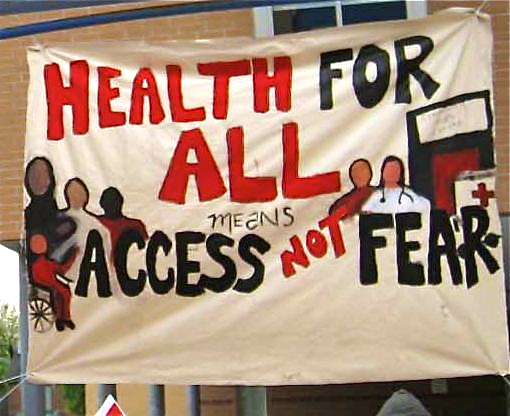Want change? Got change? Spare some and get some by becoming a member of rabble.ca.
In a shocking move, the Canadian government is cutting access to health care for refugees across Canada starting on June 30. Health groups are loudly denouncing cuts to the Interim Federal Health Program (IFHP) that provides temporary healthcare to refugees and asylum seekers in Canada.
Disregard for health and human rights
If these cuts are implemented, all refugees will lose access to essential medications, and thousands designated as coming from ‘safe countries’ will be denied healthcare services altogether, even in the case of life-threatening conditions such as heart attacks. These cuts highlight the current government’s utter disregard for health and human rights and they will leave refugees, an already vulnerable group, struggling harder for survival.
As a group of health care workers and allies who work with migrant communities, we see cuts to the IFHP as fundamentally unjust and part of a larger pattern. Over the past few years, we have seen progressively harsher immigration restrictions as Jason Kenney, our Minister of Citizenship, Immigration and Multiculturalism, seeks to fundamentally transform Canada’s immigration system.
In addition to the draconian cuts to the IFHP, the Harper government is pushing for the adoption of controversial Bill C-31.
The proposed bill, now passed third reading in the House of Commons, would grant Minister Kenney the arbitrary authority to designate certain countries as ‘safe.’ Claimants from these countries will be processed through the system with the unfair presumption that they are ‘bogus’ claimants, effectively fast-tracking deportations.
Deportations can lead to death
The case of failed refugee claimant Grise, a 24 year-old woman who came to Canada fearing for her life, highlights the dangers of this approach. Soon after being deported back to Mexico, Grise was murdered. Mexico is widely expected to be designated as ‘safe’ by Kenney.
The reality is that the stories of individual refugees are complex. In designating entire countries as ‘safe,’ Minister Kenney effectively denies refugees their basic human right to a fair process. As tragically illustrated in Grise’s case, Mexico could not ensure her safety, and the blanket designation of ‘safe’ countries will contribute to Canada’s already dysfunctional refugee determination process by worsening the physical, mental, and social wellbeing of refugee claimants. In particular, it will disproportionately impact women, individuals from LGBTQ communities and racial minorities fleeing persecution based on gender, sexuality and race.
Furthermore, under Bill C-31, Kenney plans to introduce mandatory detention for asylum seekers deemed to be ‘irregular arrivals,’ with limited opportunities for review. The designation of what constitutes an ‘irregular arrival’ is arbitrary, and arbitrary detention contravenes the International Covenant on Civil and Political Rights, to which Canada is a signatory.
Moreover, significant research points to the ill health effects of detention on mental and physical health. Studies show that detention increases the risk of anxiety, depression, post-traumatic stress disorder and self-harm behaviours in refugees. Under this bill, families will be torn apart, treated as criminals and denied basic human rights, all of which is detrimental to their health.
Impacts on migrant workers
As if this were not bad enough, the Harper government has also implemented a two-tier wage system for foreign migrant workers, who can now be paid 15 per cent less than Canadian citizens for the same work.
A recent article in the Canadian Medical Association Journal found that migrant farm workers suffer from musculoskeletal injuries, chemical exposure from pesticides resulting in eye and skin disorders, and other conditions specific to their work. They already have reduced access to health care because of long work hours, lack of transportation, language barriers and fear of being deported for seeking care. On top of this, income inequality is one of the most important predictors of health. A two-tiered wage system continues the ongoing exploitation of migrant workers in Canada and consequently exacerbates their already unmet health needs.
These policy changes need to be understood not as isolated pieces of legislation, but as part of an organized attack by Kenney, the Harper government, and vocal anti-immigration lobbyists on Canada’s existing immigration system. To compromise the health of refugees, asylum seekers, undocumented people and migrant workers openly violates international law.
Health care for all!
Ultimately, on June 30, we will see the number of migrants living without health insurance, estimated to be upwards of 500,000 across the country, increase dramatically. Half of the precarious-status migrants living without health insurance are thought to reside in the Greater Toronto Area, but only about 12,000 of those are able to access health care through Community Health Centres. Thus, while we reject Kenney’s proposed changes to the IFHP, we are also demanding access to services for all migrants currently excluded from Canada’s supposedly ‘universal’ health care system.
As doctors, nurses, healthcare workers, and activists, we stand in solidarity with a growing number of medical organizations rejecting the draconian policies of the current Canadian government with regards to the IFHP cuts, Bill C-31 and more.
We will stand alongside refugees, asylum seekers and people who are undocumented until we stop this inhumane plan. Together, we demand health care for all people irrespective of their immigration status!
Please join us on Monday, June 18 for the National Day of Action against the cuts to the Interim Federal Health Plan.
This article was written on behalf of Health for All, a migrant justice organization seeking to improve access to health care for migrant communities in Canada. Follow us on Twitter @HealthForAllTO. For Further information, please visit www.health4all.ca. Demonstrations will be occurring across Canada. For the location of the June 18 action in your city, please check here.
Nikki Bozinoff and Nanky Rai are medical students in Ontario. Ritika Goel MD and Michaela Beder MD are physicians in Toronto.



